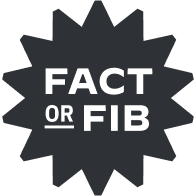Is Philadelphia Cream Cheese really from Philly?
Friday, December 29, 2023
 Make every day more interesting. Each day a surprising fact opens a world of fascinating information for you to explore. Did you know that….?
Make every day more interesting. Each day a surprising fact opens a world of fascinating information for you to explore. Did you know that….? 









| Original photo by studiomode/ Alamy Stock Photo |
| Philadelphia Cream Cheese isn't actually from Philadelphia. | The City of Brotherly Love has clear-cut claims on many food origins — cheesesteaks, stromboli, and even root beer. But one thing's for sure: Despite the name, Philadelphia Cream Cheese is definitely not from Philly. The iconic dairy brand secured its misleading name (and gold-standard status) thanks to a marketing ploy that's been working for more than 150 years … and it's all because of Pennsylvania's reputation for impeccable dairy. Small Pennsylvania dairies of the 18th and early 19th centuries were known for using full-fat milk and cream to make rich cheeses — in contrast to New York dairies, which mostly used skim milk — and because the perishables couldn't be easily transported, they gained a reputation as expensive luxury foods. So when upstate New York entrepreneur William Lawrence began making his skim milk and (for richness) lard-based cream cheese in the 1870s, he needed a name that would entice customers and convey quality despite it being made in Chester, New York, and not Philadelphia. Together with cheese broker and marketing mastermind Alvah Reynolds, Lawrence's cheese was branded under the Philadelphia name in 1880, which boosted sales and promoted its popularity with home cooks well into the early 1900s.
Lawrence is often credited with inventing cream cheese, and culinary lore frequently cites its creation as an accident. But some food historians say he wasn't the first person to concoct the cheesy spread — recipes for it had been circulating for some time in newspapers and magazines. Lawrence did, however, create the first commercial cream cheese factory, which made the product accessible to home cooks. Lawrence eventually left the dairy industry for politics, becoming the mayor of Chester, but his legacy remains in every foil-wrapped block found in an American fridge.
|
|
 | | Cream cheese and Neufchâtel cheese are the same spread. | | |
|
|
| Cream cheese and Neufchâtel cheese are the same spread. |  |  |
|
|
|
|
|
| The Smallest, Mightiest Hearing Aid on the Market | | Say hello to Horizon by hear.com. This tiny German hearing aid is taking the U.S. by storm. Why? Partly because it's tiny. Like, James Bond-device tiny. Partly because it boasts the world's first-ever dual-processing system. And with double the power comes double the clarity. That means you get maximum speech clarity with minimal background noise and, as a result, effortless conversation wherever you go. If you like, you can also stream music, adjust settings via the app, and enjoy ultra HD sound all day, every day. Ready to join the 385,000+ who can hear with crystal clarity thanks to hear.com? Sign up for a 45-day no-risk trial to test drive the bestselling Horizon hearing aids. |
|
|
|
| Famed Philadelphian Benjamin Franklin once drafted a recipe for __, a curdled alcoholic drink. |  |
|
|
 | Numbers Don't Lie |
|
 | | Year the city of Philadelphia was founded, by Englishman William Penn | | 1682 |
|
|  | | Approximate population of Philadelphia, from the 2020 Federal Census | | 1.6 million |
|
|
|
 | | Minimum percentage of fat in commercially produced cream cheese, required by the USDA | | 33 |
|
|  | | Amount (in pounds) of cream cheese topping the world's largest bagel and lox sandwich, made in NYC in 2018 | | 40 |
|
|
|
|
|
 | Cream cheese has been wrapped in foil since the 1880s. |
|
| Besides the whipped or flavored versions that usually come in plastic tubs, most American cream cheese comes in a foil-wrapped block — and it's almost always been that way. William Lawrence's first mass-produced cream cheeses were wrapped in thick tissue paper commonly used by cheesemongers. But a few years into production, the rebranded Philadelphia Cream Cheese of the 1880s opted for tin foil packaging that helped the moldable cheese keep its shape — and more importantly, provided a firm wrapper that was an easier surface on which to print the brand name. Today, Kraft (the current owner of the Philadelphia brand) says the foil helps retain moisture and freshness. | | |
|
|
|
| Thank you for supporting our advertisers. They help keep Interesting Facts free! |
|
|


posted by June Lesley at 5:26 AM


![]()
![]()
![]()
![]()
0 Comments:
Post a Comment
<< Home